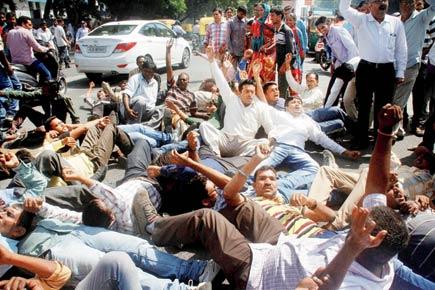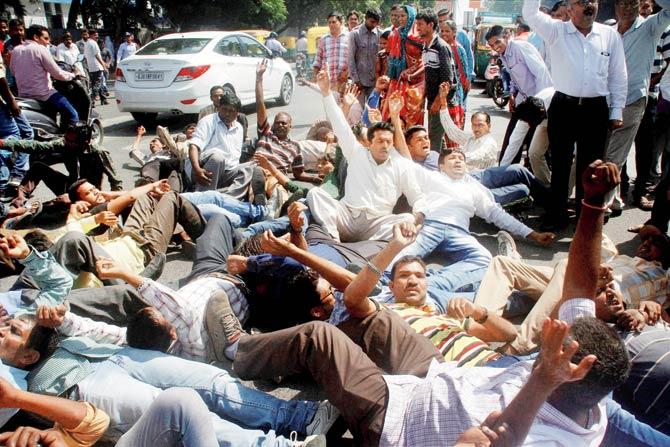It’s okay to abandon cattle when they are of no use — to allow them to survive on plastic. But, beef consumption demands death penalty


Dalit protestors hold a rasta roko in Ahmedabad to protest the attacks on their community for handling cattle carcasses. Pic/PTI
 One of the men arrested for being a part of the mob that murdered Mohammed Akhlaq in Dadri, Uttar Pradesh, last September, for the supposed crime of eating beef, died in hospital last week — from mosquito-related diseases. He was given a hero’s funeral in his village of Bishahra, where his body was draped in the national flag and taken in a procession.
One of the men arrested for being a part of the mob that murdered Mohammed Akhlaq in Dadri, Uttar Pradesh, last September, for the supposed crime of eating beef, died in hospital last week — from mosquito-related diseases. He was given a hero’s funeral in his village of Bishahra, where his body was draped in the national flag and taken in a procession.
ADVERTISEMENT
However, whether Akhlaq and his family ate or stored beef remains unclear. Beef was found at a crossroads near Akhlak’s house. But it was not found in his house. Some meat was found in his house which was sent for forensic tests. Based on that, Akhlak’s family members were arrested for storing beef. Now it turns out that there was no evidence of cow slaughter in Akhlak’s village, indeed no evidence of any animal blood.
So here we have one of our most recent and bizarre cases of death and discrimination, with the sole responsibility lying with political opportunism and divisive politics. Akhlaq was murdered in September 2015 but the conversation for many Indians remains whether he and his family ate and stored beef or not. The fact of a man’s death is of little consequence when you want to inflame religious passions and make political gains from it.
The refrain ‘cow is our mother’ is now common and the behaviour of ‘gau rakshaks’ or ‘defenders of the cow’ remains reprehensible. Or that is reprehensible to any right-thinking citizen in 21st century India. To the supporters of Ravi Sisodia, however, it is the man accused of murder of a human who is the hero. The rumour — started apparently by a certain Prem Singh — that beef was eaten was evidence enough for the supporters of cows. That a man was killed for nothing is not important.
Thus, India remains stuck in centuries past when it comes to Hindu-Muslim relations. Politicians say one thing and do another. They look for vote banks. They equate terrorist behaviour in Pakistan with Muslims in India. The other side of the coin is that they equate the antiquarian notions of Muslim ulema with the needs and hopes of Muslims in India today. The fight by Muslim women against the custom of triple talaq or the struggle of young Muslim women against the barbarian practice of female genital mutilation are just two examples of this battle against cruelty as dictated by culture.
However, no religion — whether in India or elsewhere — is free of this sort of discrimination or of using history to justify this discrimination. The very movement against cow slaughter in the 21st century — not the protection of all animals, mind you, nor the promotion of veganism against animal cruelty — is based on ancient ideas of ‘cow is our mother’. It is okay to domesticate cattle and keep cows pregnant to take their milk away from their calves to feed humans. It is also okay to abandon cows and cattle when they are of no use and leave them to starve to death. As the prime minister pointed out, many of these cows wander around eating plastic packets to survive. ‘Cow is our mother’ is then limited to killing Mohammed Akhlaq and thrashing Dalits? To save a herbivore from the eating habits of the omnivore, your only recourse is to resort to murder and violence against humans?
This hypocrisy and hatred gets easily converted into covering Ravi Sisodia’s body with the national flag. And then, even worse, this pretence that murdering Mohammed Akhlaq was the act of a ‘patriot’. So what if there is no evidence against Akhlaq or that the punishment for eating or storing beef is not murder by a mob?
I try though for a happy note, as I write this on the day of Vijaya Dashami or Dussehra. We are getting some repairs done at our home. The workers — almost all Muslim — will be leaving early today so that they can head to Dehradun’s Parade Grounds for the traditional burning of Ravana. “We have never missed it,” they tell me, “We rarely miss the Ramlila every year.”
Somewhere in this mess we have created for ourselves, of hatred and suspicion, there is this kernel of hope, of the ability to live together. It is small pickings, I know, but for today I prefer it to total despair.
Belated Shubho Bijoya!
Ranjona Banerji is a senior journalist. You can follow her on Twitter @ranjona. Send your feedback to mailbag@mid-day.com
 Subscribe today by clicking the link and stay updated with the latest news!" Click here!
Subscribe today by clicking the link and stay updated with the latest news!" Click here!







